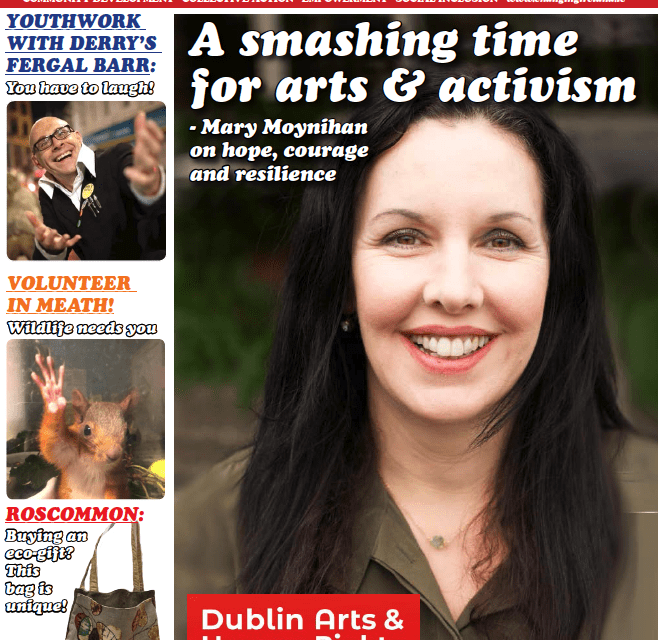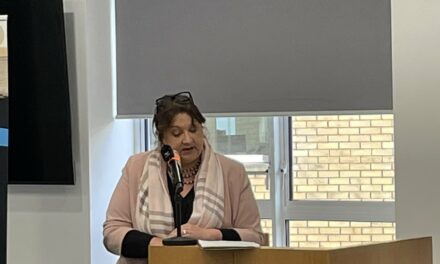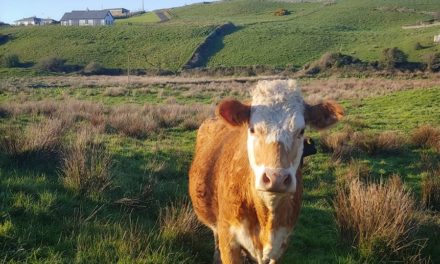I hesitated to ask Mary Moynihan if she felt she was a Covid survivor. She had no doubt about it. 30 years after founding Smashing Times, and a year after getting long Covid, Mary talks to ‘Changing Ireland’ about radical and personal empowerment. Our Autumn cover story – a long read:
“I was told I was in the mild end of the serious category. I did have to go into hospital and I did have to get oxygen, so it was quite serious. All of my family got Covid and it was in March 2020 so it was right at the beginning. Everybody recovered except for myself. I ended up sick for six weeks straight.
“I had huge difficulties with my breath – I did have asthma prior. Then I was lucky that when I got oxygen I started to recover so I didn’t stay in hospital long.
Fright of long Covid experience
“When I was recovering, that’s when I wrote the poem. I felt I was coming out of a very traumatic experience and it really brought home the important things like the people we love, living in the moment, things like nature, art – which I do love… That’s where the poem just came from.”
Her poem called ‘In Time’ was recorded as a music video by fellow-artists and can be watched online. While she shares the excitement with others in the arts and theatre world about opening up – in a careful manner – she is first and foremost simply grateful to be alive.
“I have long Covid, so I am one of the many thousands with an ongoing illness. So I fully get the seriousness of Covid. It’s still killing, maiming and leaving people with long-term serious illness. We need to be vigilant about that,” she said.
“Very Excited”
Mary is the founding director of Smashing Times, now 30 years in operation, and she retains the positivity and spark she has demonstrated throughout those years.
She said she was “very excited” about connecting once more and “not just having the arts online”.
“The arts have been very hard hit, particularly performing artists who depend on gigs and live theatre and performance.”
“It’s important we get back to work, earning a living and reconnect with one another, but in a way that’s safe.
“We’ve spent months working on guidelines around Covid compliance and health and safety. And a lot of us have adapted. For example, in ST we’re doing a lot of outdoor events for our upcoming festival.”
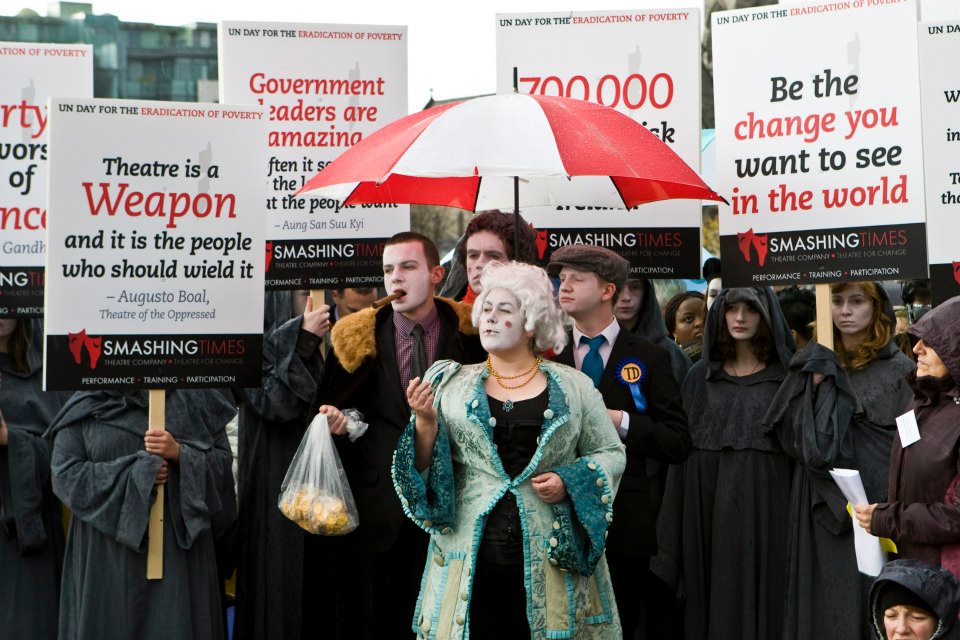
Vaccine Equity
As someone who habitually reflects on equality issues, I pointed out to her how the WHO has condemned vaccine grabbing by Ireland, the EU and other rich countries.
Mary said, “We live in a very unequal society where access to health is not equal in the first place. Vaccine equity is a human rights issue and governments need to act to ensure that the vaccines are available to every country in the world and that there is no profit involved.”
She agreed with Dr Mike Ryan when he said “Social justice is only a dream if we don’t put health justice at the centre of it”.
Influences
Given her work, there are many human rights defenders that Mary greatly admires. Asked to name who who had a big influence on her, she said, “I always say my parents first.”
Mary has previously written about the great love in her family growing up and about how her mother’s fierce independence influenced her. Now she is a mother of four children. Have any of them followed her path into the arts, activism or drama?
“I’ve three boys and a girl and they all have a strong social conscience. One is a writer and the others are business orientated,” she said.
Her mother died when she was 16, a few days after giving birth and her father without hesitation took over the role of care-giver to the family including the new born baby.
Mary’s family believe that failings in maternity care played a role.
“Women at the centre of maternity care are not being listened to,” she said. She strongly supported the campaign to make it mandatory to hold inquests when a woman dies in a maternity hospital. The story she tells of her mother’s death is one of many that fuelled the campaign and, thanks in particular to campaigning by nursing sociologist Dr Jo Murphy-Lawless, in 2019 it finally became mandatory to hold inquests.
“That was very important. It showed we needed to tell our stories. My mum always said stand up for what you believe in.”
People smuggler Mary Elmes
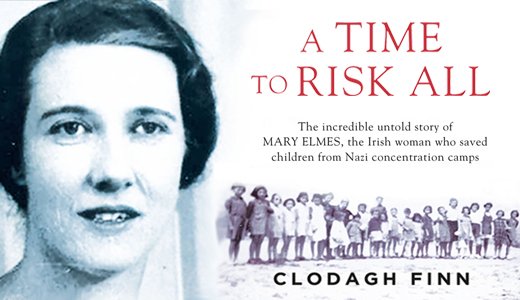
In terms of heroes, she also named Mary Elmes from Cork. Mary was a WWII era human rights defender who Smashing Times recently celebrated. She volunteered with a group of Quakers and successfully smuggled hundreds refugees out of Nazi-occupied countries.
The discovery of and celebration by Smashing Times of Mary Elmes’s story – previously unknown – is a good example of their work and impact.
It was the organisation’s connections in other European countries that revealed an Irish woman had played a Schindler’s List-style role in smuggling refugees across Nazi lines.
The presentation of her story on stage so captivated journalist Clodagh Finn that she spent a year researching and writing a book about this remarkable lady. (‘A Time to Risk All’ is published by Gill Books).
“She was non-violent, peaceful and very much believed in a shared humanity and reaching out to strangers,” said Mary.
“It’s a human right to seek sanctuary… and we need to do more on that count. We also need to close down Direct Provision which is going to happen I believe.”
The Mary Elmes story is typical of those Mary is drawn to: “We’re interested in forgotten or hidden stories. And my particular interest as an artist is in making theatre and film from historical memory of forgotten stories of women in history.”
She said that diversity is always about whose voice is not being heard and is more than just getting diverse people faround the table.
“How do you make sure that all voices are heard?” she asks.
Sexual harassment
Asked to name two issues we don’t hear enough about, she said, “You may think this is not hidden, but sexual harassment is a huge issue. There’s a whole generation of people who think we’ve moved on, but things are getting worse.”
She made her point only a day before a judge let a convicted murder off without jail time after he tried to strangle his partner and two days before sexual abuse and harassment in the Defence Forces was revealed.
She said it was important that sexual consent is discussed more with young men and women.
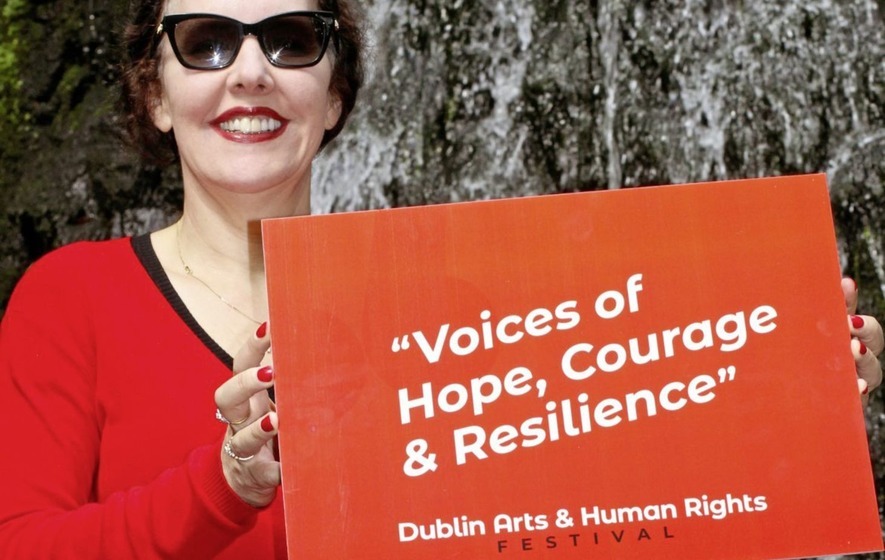
• Mary Moynihan of Smashing Times.
While the #MeToo movement undoubtedly brought good, gender-based violence continues. She believes there’s “a continuum between sexual harassment” and the worst forms of violence in society.
“Recently, I heard about a runner – a young woman – who won’t go running in the evenings anymore because of the harassment she gets. I think that’s shocking.”
“It’s talked about, but not enough. Everyone thinks it’s a woman’s issue, but it’s a men’s and boys’ issue too.”
She recalled doing a symposium on the subject with secondary school pupils in the Samuel Becket Theatre: “A young man from the inner city said this is everything to do with me. I don’t fit the gender norm for men. Men are seen as strong, as leaders, as go-getters. He said, ‘What if you’re like me and you’re none of those things?’ He just didn’t fit.”
She welcomed the fact that young people are moving away from gender binaries. She knows men can be great care-givers.
“The gender stereotype would say men are a certain way, but after my mother died, I saw my father – who used to have everything done for him – be a wonderful care-giver to a young child (her baby sibling).”
Traveller suicides
“The suicide rates in the Traveller community are also shocking. It’s wiping out a whole generation of young people and I definitely think more needs to be done about that. It’s horrific what’s going on and more support,” she said.
The suicide rate within the Travelling community is six-times higher than the wider population. Suicide is most common in young Traveller men.
Looking to where more support could be provided, she said, “I had the pleasure of working with Kildare Traveller Action where Traveller women work as Primary Healthcare Workers in their own communities. It is a really positive HSE programme. Those kind of really positive programmes need more support,” she said.
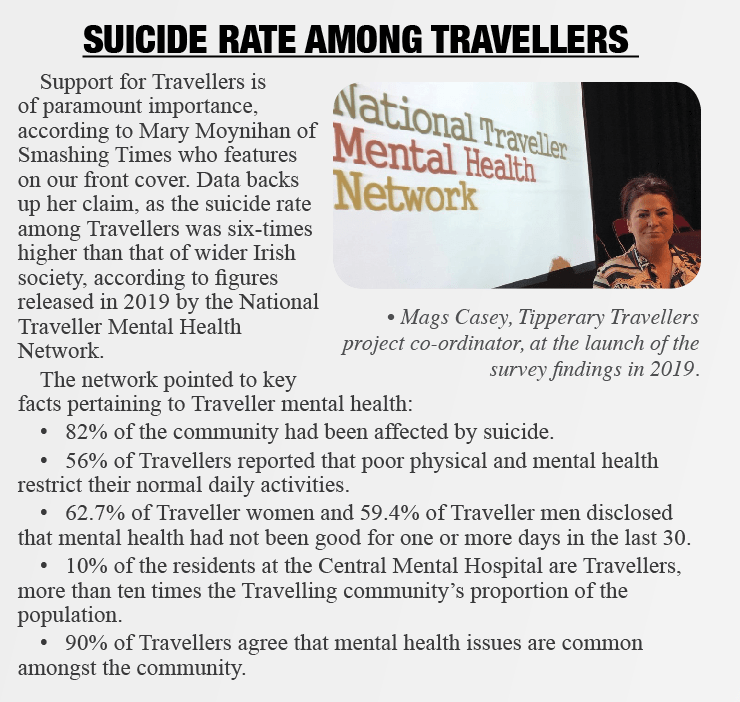
Smashing Times
Smashing Times is a great name, so where did it come from?
“The Suffragettes…. We don’t like smashing windows of public buildings, but we do want to smash taboos. We also shine a light into dark areas. We are about primarily about making art, but we care deeply about the world we live in and we want our art to impact in terms of human rights, equality and diversity.
“And because we’re about art, we’re about bringing people together. We want respect and dignity for everybody, which is what human rights is about.”
“One of the festival events in this year’s festival is called ‘State of the Art’ – it’s about the nation-state as both protector and violator of human rights. Both happen.”
Returning to Covid, she said, “I have to say the State did an amazing job dealing with Covid when it first struck compared to other countries and saved many lives by the actions it took.”
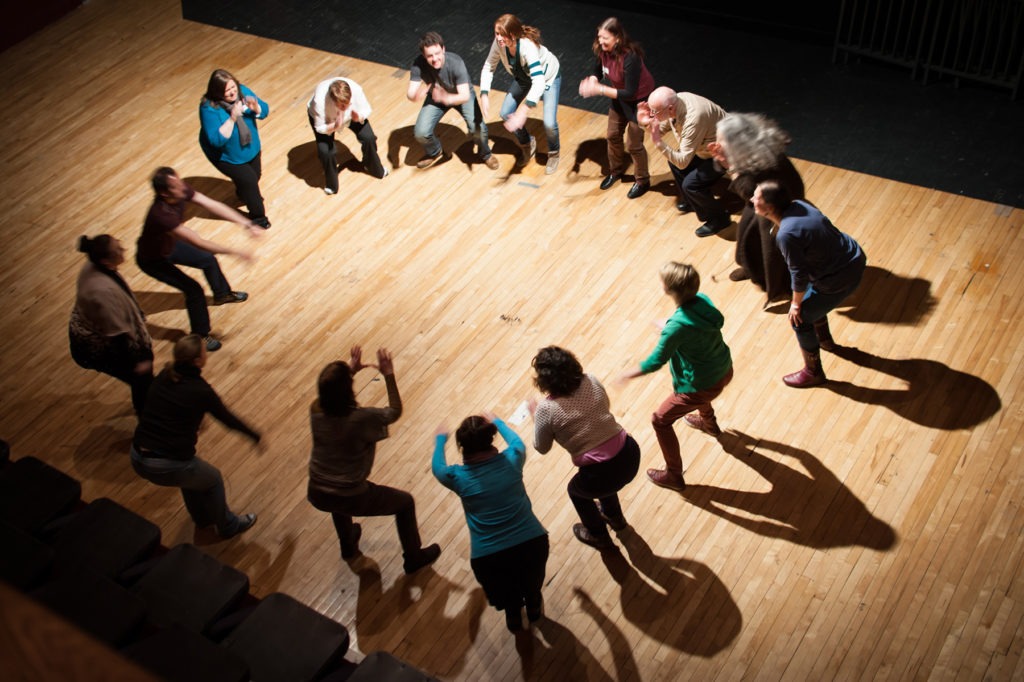
Human rights partners
“We partner with human rights organisations such as Fighting Words, the Irish Council for Civil Liberties and Frontline Defenders and they run brilliant workshops – such as knowing your rights when arrested,” she said.
The festival events are viewable online after being broadcast live.
“Frontline have really good workshops,” said Mary. One is a panel discussion called ‘The Social Life of Misinformation’ about the global misinformation crisis. It asks: ‘How can you know if something is true or false? If the far right is on the increase, why is that happening and what can we do?’”
Other festival events range from a film documenting young people’s experience of direct provision to a presentation by a radical feminist organisation from the US called ‘Guerrilla Girls’.
Five staff & €261k
Smashing Times had a core budget of €261,000 in 2019, it employs five people full-time and has a freelance panel of artists and people interested in human rights who also contribute.
Theatre can be a powerful tool for human rights, development education and community development.
“We’re very open. Join our arts and human rights network. It’s free – you can be a citizen, an artist, a community worker – it’s for anyone interested in arts and human rights. Email us,” said Mary.
“In Ireland, we ran a programme to train people to do what we do and a lot of organisations sprung out of that. For example, look up the wonderful cross-community space called The Hub in Cookstown, Co. Tyrone, run by Carol Doey who trained with us. They’ve won huge awards.”
Since 1991, Smashing Times has grown from working with communities in Coolock, Tallaght and Ballymun to being active countrywide, north-south, and across Europe.
While only going since 2019, how significant is the Dublin Arts & Human Rights Festival and are there others like it?
“It’s growing. For example, we partnered with a group in Serbia who, like us, use theatre and film in post conflict environments. Last year, because they had been involved in our festival, they held the first arts and human rights festival in Serbia.
“There’s also the ‘Imagine Festival’ in Belfast and there’s a Derry Arts and Human Rights Festival.”
Magic / positivity
We would all like to live in a world without violence or poverty – and it’s something Mary believes can happen. How can she be so positive in her outlook?
“I’ve had the pleasure of working with many different groups and communities and it has never ceased to amaze me the connections that can be made between different people, from different communities. I often see that through the arts. There’s a kind of magic in it and it always makes me feel really positive.
“The arts have been hugely successful as part of the (peace process) promoting positive community relations, enabling people to come together.
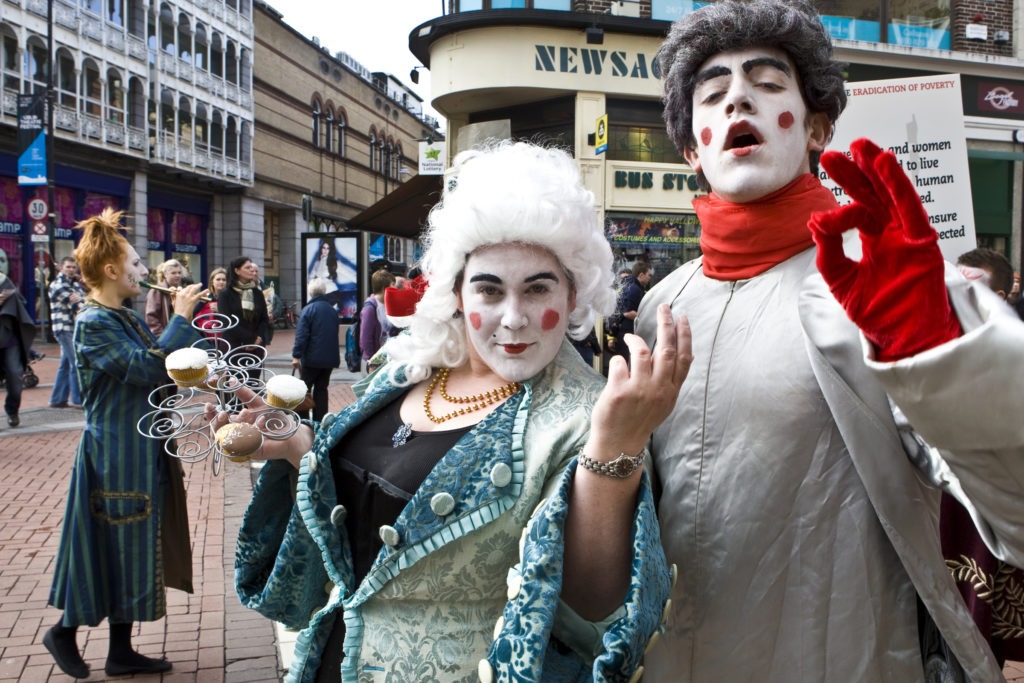
• Artists for civic action.
“The arts are full of paradox. The artd environment provides a safe space to take risks – particularly in theatre and creative processes in a workshop space. When you get into film, art, music performances, there’s a common language that comes that goes beyond the language that divides us.”
Speaking about challenges facing the community in which ‘Changing Ireland’ is based, Mary suggested Moyross become part of next year’s festival.
“The arts can envision new futures. You can use the arts to help create the vision for how we want our world to look like, if we start to tell alternative stories.
“Sometimes the dominant narrative doesn’t allow the positive stories to come forward.
“For me the dominant narrative sometimes doesn’t even allow people to say we want to connect and we want to find a way to challenge what’s wrong in society.
“We need to hear more voices and the arts can do that and envision a positive future,” she said.
Radical & personal empowerment
“On a personal level the arts enable you to grow as a person, to communicate, to stand in someone else’s shoes. We’ve worked with hard-to-reach communities and there’s always room to do more. There’s huge potential and community organisations need more support to bring the arts in, because it is an empowering tool. The arts are magical, but you need sustained, long-term engagement.
“When they talk about arts, participation is a buzzword. Real arts engagement is about embedding yourself in the community, building your connection with the group and empowering them to make the work themselves.
“Long-term sustained arts engagement is radical. Is that why it’s not funded?” she asked.

